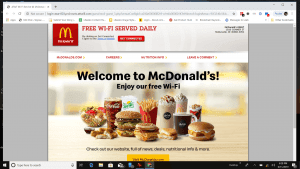
What about more serious organizations like airports? Sure these people know a thing or two about safety protocols? Well, not really. So, essentially, you are at the mercy of a person who set up the network – and even then, there’s not much they can do to secure it completely. Companies do not publish any information on policies in this field – in part because not all have them. How about other amenities, then? Do they fare better in terms of public WiFi protection? They can be, but, unfortunately, there is no way to tell. Okay, so Starbucks is probably not the best place to connect to the Internet. While only some of them will be available to a hacker in each situation, the sheer range of possibilities should give you an idea on how secure is Starbucks WiFi. With the right tools, anyone in the coffee shop can gather data from unprotected devices and, given enough time and luck, crack it open. This might be enough not to let a stranger steal them, yet you’ll probably not feel good about it. They are not in plain view, as you have locked most of them in drawers or even in a strongbox. Think of it as a room with valuable possessions. Modern phones and web services have many layers of protection that provide a certain level of public WiFi safety. Of course, sharing a network with a hacker is not the same as handing your phone to them. Having unrestricted access may be great for consumers, but it has a significant downside – it essentially allows people on the network to do things that you won’t be comfortable with. Unfortunately, the dangers of using public WiFi are very real. Whatever thoughts you might have at that moment, “Is it safe to use WiFi at Starbucks” would probably not be among them. Picture yourself in your local Starbucks casually browsing the web while waiting for your order. While it might save you some mobile data, this approach also creates considerable concerns about free WiFi security. In fact, many users set their phones to connect to discovered public networks automatically.

Nowadays, the practice has become so ubiquitous people rarely wonder if it is safe to use public WiFi. Such hotspots are usually hosted by cafes, restaurants, coffee shops, and similar businesses. What Is Public WiFi?Įssentially, public WiFi is any WiFi hotspot that does not require authentication so that anyone can jump in.

Let’s look at what risks free WiFi poses and what you can do about it. Unfortunately, such carelessness may come at a price, as public hotspots make it quite easy to hack your device and steal sensitive data. People rarely give it a second thought when browsing in a cafe or even using public Wi Fi for business to stay productive. Free WiFi has become so ubiquitous that you’d be hard-pressed to find a Starbucks that does not offer it.


 0 kommentar(er)
0 kommentar(er)
